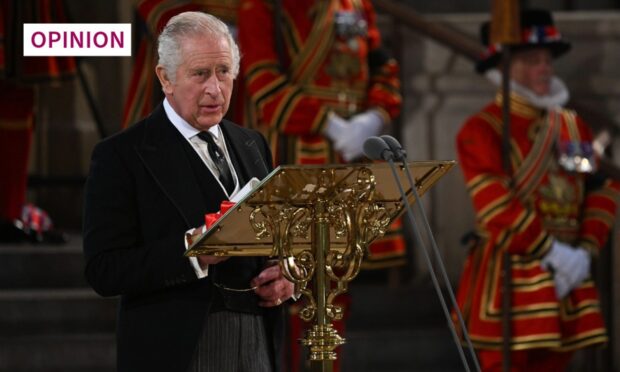When King Charles delivers his first King’s Speech to parliament next week, it will include details of the new criminal justice bill.
Ministers have recently argued that more prisons should be built to house shoplifters, with mandatory prison sentences imposed for repeat offenders, so we can only hope the worst robbers in the country are put under lock and key as soon as possible. Like the bosses of the energy companies whose profits soared to £150 billion as people shivered, and the directors of the supermarkets who have been fleecing punters at both the petrol pumps and grocery counter, wrapping it up in theories about increased profits in inflationary times being part of capitalism. Yadda, yadda, yadda. No wonder “greedflation” is the new buzzword in economics.
The RAC fingered the big supermarkets this year for excessive petrol and diesel profits, recommending they reduce prices by at least 5p per litre immediately. Meanwhile, the trade union Unite produced a report exposing profiteering across energy providers, supermarkets, shipping companies, car dealers and food manufacturers, all of whom blamed “the cost-of-living crisis”.
Food inflation was running at 17% this summer, but we saw price increases of 50% on some supermarket goods. That, of course, is not regarded as robbing the poor. That’s simply supply and demand economics for the already rich.
Mandatory sentencing ignores circumstances
Minister of State for Crime, Policing and Fire Chris Philp wants to crack down on the “specific spike” that has seen shoplifting offences soar recently to a record high. Richard Holden, a minister in the transport department, criticised police for their failure to stem shoplifting offences which have, he says, “a huge impact on our high streets and shops right across the country”. Neither bothered mentioning why it’s happening.
It’s always interesting to see politicians focus on the market rather than the people, the profit of the wealthy rather than the despair of the poor. Nobody would justify stealing. But let’s not have one vocabulary for the crimes of the affluent and another for the crimes of the poor. One is driven by greed, the other by survival. If you excused one over the other, which would it be? Certainly not the CEOs of Shell and BP.
Politicians being “tough on crime” is so often being ineffectual on crime. It’s a stance, a pose, a kiddie-on solution to complex problems.
We launched a new action plan to crack down on shoplifting today. We’ll see police attending to arrest suspects, CCTV images run through the facial recognition database, hotspot patrols and repeat offenders relentlessly targeted. Full details here: https://t.co/tr5CdvQ4Em
— Chris Philp MP (@CPhilpOfficial) October 23, 2023
There is something quite sick about discussing mandatory sentences for theft at a time when ordinary people struggle and big businesses cash in. Organised crime? Fair enough: root it out. But mandatory sentencing ignores circumstances. It’s like something out of Victor Hugo’s 19th century novel Les Misérables, in which Jean Valjean tries to redeem himself after serving a 19-year prison sentence for stealing a loaf of bread to feed his sister’s starving children.
Describing his intentions to his Italian publisher, Hugo said his book was “meant for everyone… Wherever men go in ignorance or despair, wherever women sell themselves for bread, wherever children lack a book to learn from or a warm hearth, Les Misérables knocks at the door and says: ‘Open up, I am here for you’.” Two centuries later, all of the above are still happening.
Let’s talk more about who deserves prison
Shoplifters are often female. Years ago, I visited prisons across Scotland to hear governors themselves say too many women were incarcerated, usually for crimes driven by addictions. One was Rosie, an ex-addict with 40 sentences, mainly for shoplifting, the first when she was 14. Rosie was articulate, friendly, but had a traumatic childhood. Shoplifting was like self-harm – a compulsion to take away pain.
While her actions were punished, the causes were ignored. “The minute I do it, it’s like a big deep sigh,” she explained. “It’s not the actual taking, not what it is… It’s just relief. At first, it was to feed my habit. Then it became a behaviour.”
Afterwards, the relief changed. “I hated myself for doing it. I wished I could stop,” she said tearfully. For most of her adult life, the penal system had been incapable of helping her. But, when we met, she was in an experimental unit with access to a forensic psychologist. That had changed everything.
Legal experts have warned that the measures King Charles will outline next week will create backlogs and overcrowded jails
Rosie was diagnosed as a kleptomaniac and wept with relief that somebody had finally named both her pain and her compulsion. “People are so judgmental. I tried to explain before but people said: ‘What a load of baloney’.”
The most important flaw of “more prison” as an answer to crime is the talent it squanders. Rosie had once completed two years of a sociology degree. She was capable of so much more, if only she could be helped instead of incarcerated.
Legal experts have warned that the measures King Charles will outline next week will create backlogs and overcrowded jails. “Build more!” Says Richard Holden. Well, build more prisons if you like, minister. But let’s have a thorough conversation about who deserves to be locked up in them.
Catherine Deveney is an award-winning investigative journalist, novelist and television presenter











Conversation